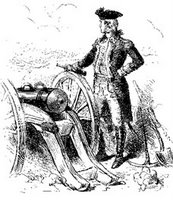An Alarm as Occasioned a Great Blustering
 In early February 1776, it appears, Boston selectman Timothy Newell was startled by the sound of artillery. Which seems odd since he was stuck inside a besieged town that was the main battleground of a civil war. But I think his surprise tells us something about warfare in the eighteenth century
In early February 1776, it appears, Boston selectman Timothy Newell was startled by the sound of artillery. Which seems odd since he was stuck inside a besieged town that was the main battleground of a civil war. But I think his surprise tells us something about warfare in the eighteenth century
On the 2nd, Newell wrote in his diary:
Just at 11 oclock at night, some wanton soldier or officer fired a bomb from the battery, at New Boston, which bursted in the air, did no harm, but made such an alarm as occasioned a great blustering.“New Boston” was the western wing of the peninsula, nearest to Cambridge, where the Americans had their headquarters.
On the 4th he wrote:
At half past nine in the evening, 3 cannon fired from the lines at Charlestown and a number of small arms at the Soldiers pulling down the Mills—say two men killed and one wounded. The next day many cannon fired.The “Mills” were powered by the tides in the Charles River estuary.
I suspect what made these events notable for Newell—guns fired during a war!—was the time of year. February was the middle of winter, and eighteenth-century armies usually sat out that season. The British army was mostly concerned with keeping warm and fed. The Americans probably had enough food, but also hunkered down in their barracks. In his 1849 History of the Siege of Boston, Richard Frothingham wrote, “Through the month of February,...no enterprise of importance was undertaken.”

No comments:
Post a Comment